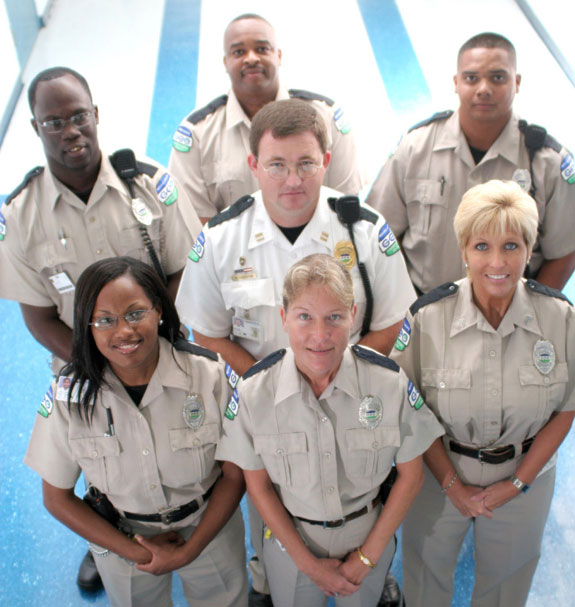
Boca Raton-based GEO Group would be among the for-profit companies to benefit if the state privatizes prisons. (Photo courtesy of GEO Group.)
By Howard Goodman
Florida Center for Investigative Reporting
The state Senate appears ready for battle today over a GOP plan to turn over a lot more of the state’s prisons to private companies.
Republican leaders have been pushing hard to privatize one-fifth of the state’s corrections facilities along with all inmate health care. Right now, about 9,000 inmates are in the state’s seven privately run “correctional facilities,” a small fraction of the roughly 100,000 people incarcerated in the third-largest state prison system in the United States.
But the privatization plan has run into opposition, not only from Democrats but from some skeptical Republicans as well.
State Sen. Paula Dockery released a report showing that the state’s existing private prisons aren’t actually saving money over publicly run prisons — undercutting the outsourcers’ strongest argument.
She’s been joined in opposition by Sen. Mike Fasano, a Pasco County Republican who was stripped of his chairmanship of the criminal justice budget committee after questioning the privatization deal. Senate President Mike Haridopolos yanked the chairmanship after Fasano offered an amendment requiring a thorough study of privatization’s costs and benefits.
That amendment failed yesterday in a close vote, 21-19 — a close enough vote that GOP leaders couldn’t be sure they’ll be able to pass their privatization bill, which they plan to present today.
Months ago, Gov. Rick Scott fired his first corrections secretary, Ed Buss, for his tepid support for the lawmakers’ plans to privatize “all of the prisons in the 18-county region south of Polk County to the Florida Keys,” according to the Palm Beach Post.
Dockery, a Republican from Lakeland, was obviously referring to such heavy-handed moves in a statement issued yesterday. “In an effort to privatize our state’s prisons, Senate leaders are acting like politicians at their worst — twisting arms in backrooms and giving contracts to special interest donors,” Dockery said. “They need to start acting like any business in the private sector would and stop using imaginary numbers.”
Proponents of the sweeping privatization plan insist that Florida will save 7 percent over state-run prisons. But Dockery has noted that there are few reliable comparisons — prisons differ so greatly. And “there’s extensive evidence that shows private prisons have received the cream-of-the-crop inmates — leaving the state with more-expensive sick, elderly and dangerous prisoners.”
If private prisons do save money, she noted, it will be by cutting wages and benefits for correctional officers, many in small-town Florida. Or by cutting staff, at the risk of weakening security.
Unions, naturally enough, are against the idea. And in an odd pairing, so are the tea party and the NAACP. Both came out against the privatization plan, the 80-group Tea Party Network saying it was concerned about “crony capitalization and deals that ultimately turn out to be bad for taxpayers,” and the venerable civil-rights group saying the goal of prison-management companies is maximizing profits, not keeping the public safe.
Who’s in favor of it? Here’s a clue:
The Palm Beach Post showed that the two leading prison-for-profit companies — Boca Raton-based GEO Group and Corrections Corporation of America, or CCA — lobbied heavily in the legislature, giving nearly $2 million to candidates and political parties since Scott’s election.
Even if private prisons save money, there are good reasons to worry it’s a bad idea. As The Economist magazine — hardly a liberal journal — has noted, the very efficiency of private companies might pose a serious problem for democracy. “Contractors have every incentive to make themselves seem necessary,” the magazine wrote in 2010.
And added:
It is well-known that public prison employee unions constitute a powerful constituency for tough sentencing policies that lead to larger prison populations requiring additional prisons and personnel. The great hazard of contracting out incarceration “services” is that private firms may well turn out to be even more efficient and effective than unions in lobbying for policies that would increase prison populations.
When we add to the mix the observations that America already puts a larger proportion of its population behind bars than does any other country (often for acts that ought to be legal), and that the US already spends an insane portion of national income on the largely non-productive garrison state, it is hard to see the expansion of a for-profit industry with a permanent interest in putting ever more people in cages as consistent with either efficiency or justice.
UPDATE — 12:30 am Wednesday, Feb. 15. In a dramatic confrontation with Senate leaders, the bill was defeated, 21-19.
